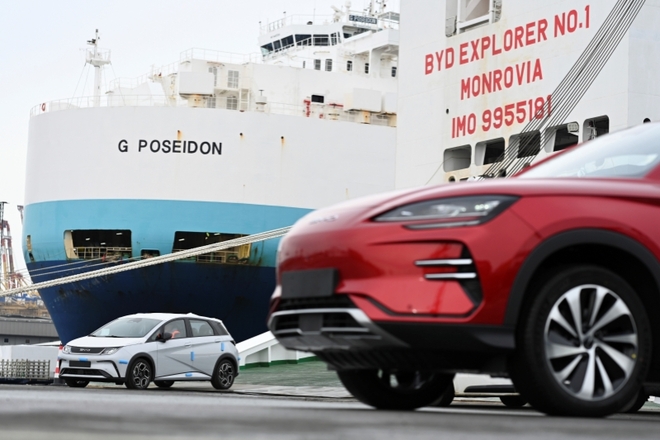Overseas Expansion of Chinese Electric Vehicle-Makers Reaches Crossroads as EU Tariffs Stymie Plans(AI Translation)
Listen to the full version


文|财新周刊 安丽敏 余聪
By Caixin Weekly’s An Limin and Yu Cong
2024年6月12日,欧盟委员会(下称“欧委会”)预披露对中国产电动汽车反补贴调查初裁结果。这场持续八个月的调查还没有最终结束,中欧之间围绕电动汽车的博弈角力也才刚刚开始。
On June 12, 2024, the European Commission (hereinafter referred to as the "EC") preliminarily disclosed the results of its anti-subsidy investigation into Chinese-made electric vehicles. This investigation, which has been ongoing for eight months, is not yet concluded, and the tug-of-war between China and Europe over electric vehicles is just beginning.
2023年10月,欧委会对中国产电动汽车正式启动反补贴调查,调查预计不超过13个月。在调查启动9个月内,欧委会有权加征临时关税。
In October 2023, the European Commission officially launched an anti-subsidy investigation into electric vehicles produced in China. The investigation is expected to last no more than 13 months. Within the first nine months of the investigation, the European Commission has the authority to impose provisional tariffs.
欧委会认为,中国生产的电动汽车从政府提供的补贴中获益,导致产品价格更具竞争力;随着中国电动汽车大举出口欧洲,市场份额不断提升,欧盟汽车工业企业受到损害。欧委会还在一份情况简报中称,中国电动汽车价格比欧盟类似产品低20%,反映出中国的电池供应和产能可能已经“过剩”。
The European Commission believes that electric vehicles produced in China benefit from government subsidies, leading to more competitive pricing. As Chinese electric vehicles are being exported to Europe in large numbers, their market share continues to grow, causing harm to European auto industry companies. Furthermore, the European Commission stated in a briefing that the prices of Chinese electric vehicles are 20% lower than similar products in the EU, reflecting a potential "overcapacity" in China's battery supply and production.

- DIGEST HUB
- The European Commission (EC) has initiated an anti-subsidy investigation into Chinese-made electric vehicles, alleging competitive pricing due to government subsidies.
- Provisional tariffs might be imposed starting July 4, with Chinese manufacturers like SAIC, Geely, and BYD facing differentiated tariff rates.
- The tariffs increase the overall cost of Chinese electric vehicles in Europe, potentially impacting exports, with companies considering localized production in Europe as a long-term solution.
On June 12, 2024, the European Commission (EC) preliminarily disclosed the outcomes of its ongoing anti-subsidy investigation into Chinese-made electric vehicles (EVs), initiated in October 2023. The investigation, expected to last no more than 13 months, revealed that Chinese EVs benefit from government subsidies, making them 20% cheaper than EU counterparts and causing harm to the European auto industry. If unresolved, provisional anti-subsidy duties will be enforced starting July 4, potentially becoming permanent for five years [para. 1][para. 2][para. 4][para. 5].
Key Chinese manufacturers sampled in the investigation include SAIC Motor, Geely Auto, and BYD, facing differentiated tariffs of 38.1%, 20%, and 17.4%, respectively. Multinational companies like Tesla, BMW, and Renault, producing in China and exporting to Europe, may also face tariffs. The overall tariff level for Chinese-made EVs will rise significantly, potentially stoking further tensions [para. 5][para. 6][para. 8][para. 9].
Experts suggest that while there is still time for negotiation before the imposition of tariffs, significant changes in tax rates are unlikely. Maintaining open communication channels remains crucial, as complexities and unpredictable critical points persist in China-EU relations [para. 11][para. 12][para. 13]. Nonetheless, China's Ministry of Commerce views the EU's actions as harmful and inconsistent with World Trade Organization rules, pledging necessary measures to protect Chinese industry interests [para. 14][para. 15].
Subsequently, European automakers and other stakeholders are actively lobbying to prevent an escalation of trade conflicts. Europe represents the most significant export market for Chinese EVs. In 2023, China exported 482,000 battery electric vehicles (BEVs) to the EU, comprising 45.1% of its total EV exports. If a 21% uniform tariff is imposed, short-term exports could drop by 30%, posing immediate setbacks [para. 17][para. 18][para. 19].
The anti-subsidy investigation has already impacted exports, with a noted decline in the first four months of 2024. A backlog of Chinese EVs at European ports indicates slowing sales and logistical issues exacerbated by tightened customs controls, suggesting periodic challenges for Chinese EVs in Europe [para. 20][para. 21]. Long-term solutions like localized production are cited as viable pathways to address trade conflicts effectively [para. 22][para. 23][para. 24].
Most European automakers, particularly Volkswagen and BMW, oppose the EU’s additional tariffs due to their reliance on the Chinese market. They argue that such measures would weaken Europe’s automotive sector competitiveness and trigger protectionism [para. 28][para. 29][para. 30]. However, as European EV sales grapple with reduced demand and halted subsidies, transitioning to electrification has proven challenging [para. 31][para. 32][para. 33].
Chinese EV brands, competing with established European brands, are affected by substantial cost disparities. Investments in local battery industries and EV production remain under development, complicating Europe’s capacity to match China’s supply chains [para. 36][para. 37][para. 40].
Amid growing trade tensions, European companies, notably Stellantis and Renault, are exploring partnerships with Chinese counterparts to advance EV development, potentially avoiding heightened tariffs. Conversely, smaller and less established Chinese EV manufacturers may scale back their European presence due to increased costs and logistical hurdles [para. 58][para. 59][para. 60].
Following setbacks in Europe, Chinese automakers may pivot towards other emerging markets like ASEAN and South America, where demand for EVs is burgeoning. Companies are establishing production bases and leveraging growth opportunities in these regions [para. 68][para. 69][para. 70].
Despite anticipated short-term declines, the consensus remains cautiously optimistic about the future of Chinese automotive exports. The emphasis is on adapting to market dynamics, diversifying export destinations, and accelerating localized production to ensure long-term prospects remain robust [para. 72][para. 74][para. 75].
- SAIC Motor Corporation Limited
上汽集团 - SAIC Motor Corporation Limited is a Chinese automotive company that was heavily impacted by the EU's decision to impose anti-subsidy tariffs on Chinese electric vehicles. SAIC's MG4 model has seen rapid sales growth in Europe. With tariffs up to 38.1%, SAIC's European sales are at risk, leading the company to consider localizing production, possibly in Turkey or expanding its UK factory.
- Geely Automobile Holdings Limited
吉利汽车 - Geely Automobile Holdings Limited, a Chinese company, owns Volvo Cars and has significant investments in Sweden. Its automobile brand, including Zeekr, has flexible localization options, like Magna's Austrian factory. Geely's EX30 electric model, currently manufactured in China, may shift production to Volvo's European facilities. The company's diverse investments and partnerships suggest potential resilience against EU tariff impacts.
- BYD Company Limited
比亚迪 - BYD Company Limited, a prominent Chinese electric vehicle manufacturer, has been affected by the EU's anti-subsidy investigation, facing a 17.4% tariff on its electric vehicles. Despite this, BYD is committed to the European market, having opened a flagship store in Paris and planning to establish a factory in Hungary with a capacity of 200,000 units, while exploring additional production sites in France or Germany.
- Tesla Inc.
特斯拉 - Tesla Inc. is included in the EU anti-subsidy investigation into Chinese electric vehicles exported to Europe. The company has applied for a separate tariff rate. If imposed, tariffs would increase overall vehicle costs. Tesla's Model 3 prices in Europe may be raised from July 1, 2024, in response to potential tariffs.
- BMW Group
宝马集团 - BMW Group opposes the EU's additional tariff on Chinese electric vehicles, stating it will impede European automakers' development and harm European interests. BMW's all-electric SUV, the iX3, which is produced exclusively in Shenyang, China, may be impacted by the tariff. With about one-third of its sales coming from China, BMW is concerned that its business in the Chinese market might also be affected.
- Renault
雷诺 - Renault plans to collaborate with Chinese automakers to develop electric vehicles priced under 20,000 euros and manufacture them at its overseas factories. By working with Chinese firms, Renault aims to produce cost-effective EVs in a cooperative effort to enhance its competitive edge in the market.
- CATL
宁德时代 - CATL, a leading Chinese battery manufacturer, has been a crucial player in the global electric vehicle industry. The company has collaborated with Stellantis to supply lithium iron phosphate batteries in Europe and is exploring potential joint ventures. CATL has introduced a technology licensing service model to expand its market reach, which has been well-received by various car manufacturers and battery companies.
- Chery Automobile Co. Ltd.
奇瑞汽车 - Chery Automobile Co. Ltd. is focusing on emerging markets such as Brazil and Mexico, where it has begun to gain traction. The company recently increased its presence in these regions, targeting segments like electric and hybrid vehicles. In Mexico, Chery's fuel-efficient models like the Tiggo 8 have become quite popular. The company aims to capitalize on both fuel and electric vehicle markets amidst the global shift towards electrification.
- GAC Group
广汽集团 - GAC Group's chairman, Zeng Qinghong, emphasized the importance of the fuel vehicle market during a recent visit to Mexico and the U.S., noting that fuel vehicles still dominate. GAC aims to enhance its fuel vehicle supply chain to improve global competitiveness, indicating a continued focus on both fuel and electric vehicles for international markets.
- Volvo Cars
沃尔沃汽车 - Volvo Cars, acquired by Geely Holding Group in 2010, heavily invested in Sweden, including R&D centers. It produces the EX30 electric model in China for export to Europe, but may shift production to European factories due to EU tariffs. Volvo has plans for global manufacturing of the EX30 model.
- Mercedes-Benz
梅赛德斯-奔驰 - Mercedes-Benz has faced issues in Europe's electric vehicle transition, with its plans to go fully electric by 2030 now revised to include internal combustion engine models post-2030. It is also part of the ACC, which paused battery plant projects in Europe. Mercedes-Benz opposes EU's anti-subsidy tariffs on Chinese EVs, fearing a negative impact on European automotive competitiveness.
- Great Wall Motors
长城汽车 - Great Wall Motors announced a shift to a light-asset operation for its European headquarters on May 31, 2024. Dataforce reported that Great Wall Motors sold only 1,621 vehicles in Europe during the first four months of 2024. This indicates a strategic pivot in response to challenges in the European market.
- August 2013:
- China and the European Commission reached a price undertaking agreement concerning the anti-dumping investigation on photovoltaic products.
- October 2023:
- The European Commission officially launched an anti-subsidy investigation into electric vehicles produced in China.
- After October 2023:
- The European Commission stated that within the first nine months of their investigation, they have the authority to impose provisional tariffs.
- May 14, 2024:
- The United States imposed a 100% tariff on Chinese electric vehicles.
- May 31, 2024:
- The Kiel Institute in Germany released a report estimating the impact of a 20% countervailing duty on Chinese EV exports to Europe.
- June 4, 2024:
- Automotive Cells Company (ACC) announced the suspension of construction at its two battery plants in Germany and Italy.
- By June 12, 2024:
- The European Commission preliminarily disclosed the results of its anti-subsidy investigation into Chinese-made electric vehicles.
- June 12, 2024:
- Volkswagen Group issued a statement opposing the European Commission's decision to impose countervailing duties on Chinese-made electric vehicles.
- Before July 4, 2024:
- The Chinese government and businesses still have a chance to communicate with the European Union to reach an agreement.
- GALLERY
- PODCAST
- MOST POPULAR





 Sign in with Google
Sign in with Google
 Sign in with Facebook
Sign in with Facebook
 Sign in with 财新
Sign in with 财新